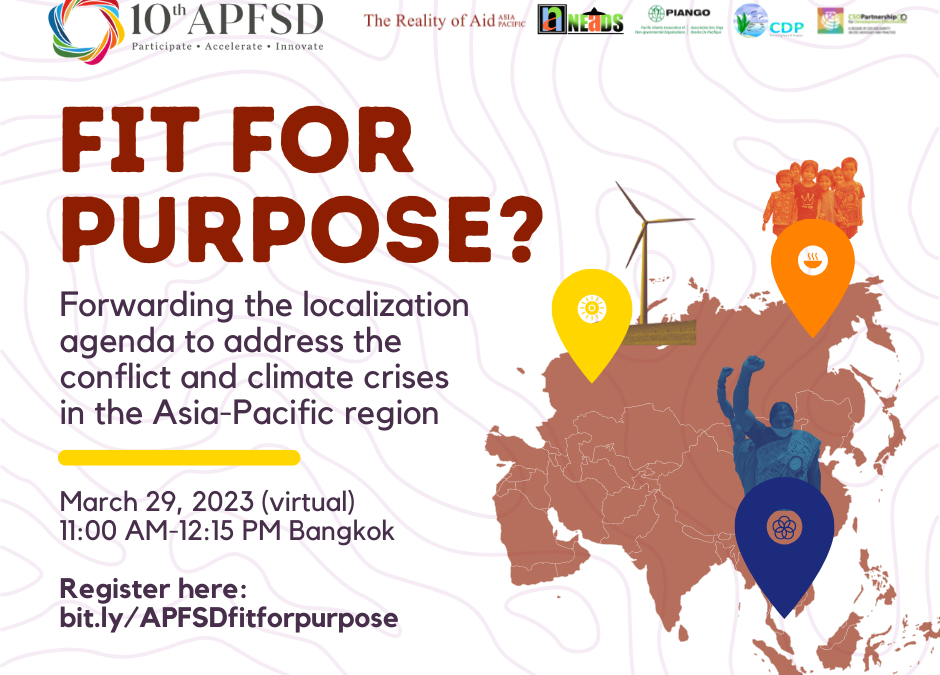PRESS RELEASE
16 March 2023
This coming March 27 to 30, the United Nations Economic and Social Commission for Asia and the Pacific (UNESCAP) will hold the 10th Asia-Pacific Forum on Sustainable Development (APFSD) in Bangkok, Thailand. With the theme, “Accelerating the recovery from the coronavirus disease (COVID-19) and the full implementation of the 2030 Agenda for Sustainable Development at all levels in Asia and the Pacific”, the APFSD aims to assess progress on SDGs 6 (Clean water and sanitation), 7 (Affordable and clean energy), 9 (Industry. Innovation, and infrastructure), 11 (Sustainable cities and communities), and 17 (Partnership for the Goals). The forum is set to provide regional perspectives on the implementation of Agenda 2030 through articulations of regional trends, best practices and lessons learned.
At the sidelines of the forum, the Reality of Aid-Asia Pacific (RoA-AP), together with the North-East Affected Area Development Society (NEADS), Pacific Islands Association of Non-governmental Organisations (PIANGO), Coastal Development Partnership (CDP), and the CSO Partnership for Development Effectiveness-Asia (CPDE Asia), will be holding a virtual side-event on SDG 17 and localization, entitled “Fit for Purpose?: Forwarding the localization agenda to address the conflict and climate crises in the Asia-Pacific region”. The event will be held on March 29 at 11:00 AM – 12:15 PM (Bangkok). Interested participants can register here.
For assistance to be effective, efficient and impactful, development actors have been calling for the localization of aid and development processes as a crucial initiative in forwarding Goal 17 or partnerships for the goals. With this, the side-event aims to promote a greater understanding of the localization agenda, especially its contribution in addressing the challenges of conflict and climate change, and the role of various development actors in providing support to local actors. The side-event will also be an opportunity to share how global localization commitments can be translated into practice in Asia Pacific.
The side-event will bring together different development actors in the region to discuss their various initiatives surrounding localization, and to foster dialogue on how these can be further strengthened and improved. Curt Garrigan from UNESCAP’s Sustainable Urban Development Division, Joana Villaflor from Start Network, Jahangir Hasan Masum from Coastal Development Partnership (CDP), Emeline Siale Ilolahia from the Pacific Islands Association for Non-governmental Organisations (PIANGO), and Tirtha Prasad Saikia from North-East Affected Area Development Society (NEADS) will share their valuable insights on the topic.
In a time of overlapping challenges in the region, specifically that of the climate and conflict crises, it is crucial to engage in discussions that amplify the role of local communities and organizations in responding to multifaceted issues. The localization agenda is a way to implement nuanced and innovative solutions to address the impacts of regional challenges to communities. However, such initiatives cannot be pursued by local CSOs and communities alone. Development actors, donor countries, multilateral institutions, and even international NGOs (INGOs) must step up to provide necessary funding and capacity development efforts to assist local actors. Pursuing the localization agenda is also a step towards reimagining partnerships in development cooperation, promoting people’s democratic ownership over their own development priorities, empowering local actors to implement innovative solutions to crises, and genuinely addressing the needs of the marginalized in the region and beyond.#
For more information, please contact Tala Batangan at tbatangan@realityofaid.org.
Follow us on our social media – Facebook (https://www.facebook.com/ROAasiapacific) and Twitter (@realityofaidAP).

